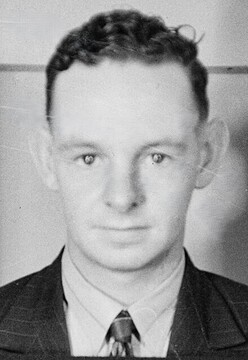WILLS, Donald Mckenzie
| Service Number: | 437462 |
|---|---|
| Enlisted: | 12 February 1942, Broken Hill, NSW |
| Last Rank: | Flying Officer |
| Last Unit: | Not yet discovered |
| Born: | Broken Hill, New South Wales, Australia, 16 March 1924 |
| Home Town: | Broken Hill, Broken Hill Municipality, New South Wales |
| Schooling: | Not yet discovered |
| Occupation: | Not yet discovered |
| Memorials: |
World War 2 Service
| 12 Feb 1942: | Enlisted Broken Hill, NSW | |
|---|---|---|
| 30 Jan 1943: | Involvement Flying Officer, 437462 | |
| 30 Jan 1943: | Enlisted Adelaide, SA | |
| 30 Jan 1943: | Enlisted Royal Australian Air Force, Flying Officer, 437462 | |
| 8 Sep 1945: | Discharged |
Help us honour Donald Mckenzie Wills's service by contributing information, stories, and images so that they can be preserved for future generations.
Add my storyBiography contributed by Elsa Reuter
James Hetherington, "Honoured for bravery in skies over Europe," City North Messenger, 29 July 2016.
Awarded the Legion of Honour
Donald Wills had no fear of dying in the skies over World War II-ravaged France and Germany. "I was not afraid of being killed but had the dread of being burnt and surviving," Mr Wills, now 92, says. The Lancaster bomber gunner emerged from the war unscathed - although he was shot down in 1944 - to receive the Legion of Honour, France's highest military decoration this month along with other airmen who fought to liberate western Europe from the Nazis.
Mr Wills flew more than 30 missions with the RAAF's No. 463 Squadron after enlisting in 1943. Bomber crews had the lowest life expectancy of the Australian fighting arms but Mr Wills says he and his mates knew the "reality of the job" at hand. "In myself, I was at peace."
The Allity Aged Care, Walkerville resident received the French decoration this month, two years after the 70th anniversary of the D-Day invasion. During the ensuing campaign his plane bombed German positions in the French city of Caen. "The German army strongly defended the area and held back the advance of the invasion forces," he said. "This raid was just after daybreak and I have no idea how many aircraft were involved but from the rear turret, it looked like a swarm of wasps. We encountered a lot of anti-aircraft (fire) but no damage."
A few months later his Lancaster was hit by flak and he baled out of the burning plane over Boulogne. "We were told that there were no anti-aircraft guns so we were to bomb much lower than usual," Mr Wills recalls. "As it was a matter of only minutes in the target area, it was decided to not issue us with the normal escape kit and money. Up to the moment the flight had been without incident. Then there were two unexpected explosions (and) to my amazement I saw a petrol tank in flames go past my turret. My feeling at this time was that our end had come."
Mr Wills scrambled out of the burning plane and parachuted down into a ploughed field, where he was met by a French farming family. At the time he had no idea if he was in Allied or enemy territory.
"It was vital that I hid my parachute in case these people were going to help me," he said. "The presence of my parachute could spell disaster for them." As it was he had landed on friendly soil and was soon at an Allied base drinking "the best cup of tea in his life".
The Broken Hill lad at first wanted to be a pilot but after training in Victor Harbor and Parafield settled on the highly dangerous - and lonely - rear gunner role. "At the time, Australia had little need for air gunners," Mr Wills said. "We did not have the required type of aircraft. I was among a dozen or so air gunners to go to an operational training unit. Consequently we all became close to each other, more or less as brothers."












